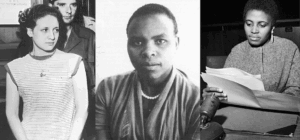Women and Anti-Colonialism in Africa – NEW!
This module introduces students to the intersection of gender and resistance to settler colonialism in Africa in the decades after WWII. It focuses on three case studies from across the continent, one from North Africa, East Africa, and South Africa, and the roles of individual women who were instrumental in their nation’s anti-colonial movements during the 1950s and 1960s. These women are Zohra Drif of Algeria, Wambui Waiyaiki Otienno of Kenya, and Miriam Makeba of South Africa. Through two weeks of class, students will begin by examining ideas about sex and gender in European colonialism, followed by focused lessons that draw on memoirs and multimedia primary sources (film, video, and music) to examine the roles and strategies of Drif, Otieno, and Makeba. In doing so, students will consider how these rebel women exploited colonial stereotypes about sex and gender to advance their respective resistance movements.
Original version authored by Devin Leigh
Readings and Primary Sources
Module Lesson Plan:
- Women-and-Anti-Colonialism-0.0-Module Lesson Plan
- Women-and-Anti-Colonialism-0.1-Schedule at a glance
Lesson 1:
- Women-and-Anti-Colonialism-1.1-Reading 1-Introduction
- Women-and-Anti-Colonialism-1.2a-Primary Sources-Image Pair A
- Women-and-Anti-Colonialism-1.2b-Primary Sources-Image Pair B
Lesson 2:
Lesson 3:
Lesson 4:
- Women-and-Anti-Colonialism-4.1-Reading 4-South Africa
- Women-and-Anti-Colonialism-4.2-Primary Source-Makeba
Lesson 5:

